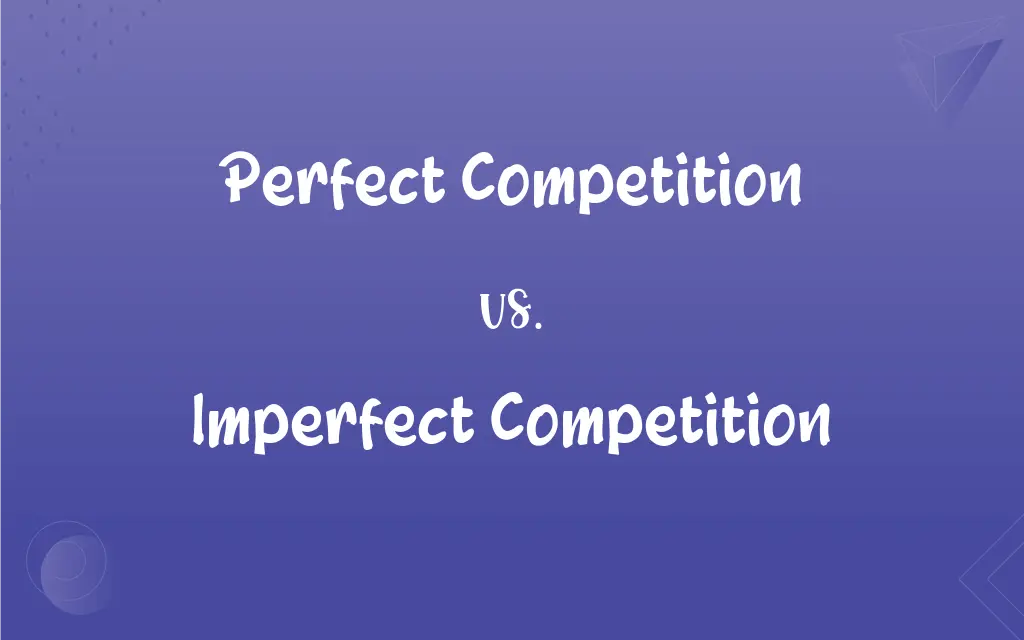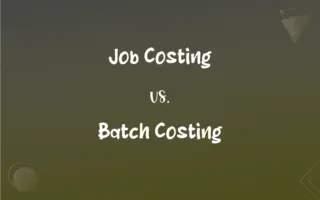Perfect Competition vs. Imperfect Competition: What's the Difference?
Edited by Harlon Moss || By Janet White || Published on November 26, 2023
Perfect Competition is a market with many sellers offering identical products and no barriers to entry, while Imperfect Competition is any market structure that doesn't meet these criteria.

Key Differences
Perfect Competition and Imperfect Competition represent two fundamental concepts in economic theory relating to market structures. In a Perfect Competition environment, numerous sellers offer identical products with no one having significant market power. Prices in such a market are determined by supply and demand forces, with both buyers and sellers being price takers. Imperfect Competition, however, is characterized by markets where individual firms have some degree of market power, which allows them to influence prices or product offerings.
The key hallmark of Perfect Competition is the absence of product differentiation. Every product is considered a perfect substitute for another, ensuring that consumers have no preference over which firm's product they purchase. Imperfect Competition, conversely, can encompass various market structures like monopolistic competition, oligopoly, and monopoly, where firms offer differentiated products or there are limited numbers of sellers.
Barriers to entry play a crucial role in differentiating Perfect Competition from Imperfect Competition. In Perfect Competition, there are no barriers, meaning new firms can enter the market freely and compete. However, in Imperfect Competition, barriers to entry, whether high or moderate, exist. These barriers can be due to factors like high startup costs, brand loyalty, or economies of scale.
In terms of information symmetry, Perfect Competition assumes that all market participants, both buyers and sellers, have complete and perfect information about products, prices, and market conditions. This is not the case in Imperfect Competition, where information can be asymmetrical or imperfect, giving certain participants an advantage.
Lastly, in Perfect Competition, firms are unable to earn long-term economic profits since any existing profits attract new entrants, driving prices down. In Imperfect Competition, due to barriers and differentiation, firms can earn both short-term and long-term economic profits.
ADVERTISEMENT
Comparison Chart
Product Differentiation
No differentiation (identical products).
Products can be differentiated.
Number of Sellers
Numerous sellers.
Can be one, few, or many, but with market power.
Barriers to Entry
No barriers to entry.
Existence of barriers (high to moderate).
Information
Perfect information symmetry.
Possibility of information asymmetry.
Economic Profits in the Long Run
No long-term economic profits.
Possible long-term economic profits.
ADVERTISEMENT
Perfect Competition and Imperfect Competition Definitions
Perfect Competition
A market with many sellers, identical products, and free entry/exit.
The agricultural market for a specific crop, like wheat, can be close to Perfect Competition.
Imperfect Competition
Any market structure not meeting the criteria of perfect competition.
The smartphone industry, with few dominant brands, is an example of Imperfect Competition.
Perfect Competition
A market structure with no long-term economic profits due to fierce competition.
In Perfect Competition, if lemonade stands proliferate in a park, profits per stand will eventually diminish.
Imperfect Competition
An environment where there's some degree of information asymmetry among participants.
The health care sector, where providers know more than patients, represents Imperfect Competition.
Perfect Competition
A market where no individual seller or buyer has any control over prices.
In a Perfect Competition scenario, individual fisherman selling in a common market can't influence fish prices.
Imperfect Competition
A market structure where firms have some control over prices.
A brand-driven industry like sneakers exhibits Imperfect Competition due to brand loyalty.
Perfect Competition
A scenario where firms are price takers, not price makers.
Vendors selling identical products in a large flea market operate under Perfect Competition conditions.
Imperfect Competition
A scenario where product differentiation and barriers to entry exist.
The airline industry, with varying service levels and high entry costs, showcases Imperfect Competition.
Perfect Competition
An ideal market structure that assumes perfect information and no transaction costs.
Stock exchanges with numerous buyers and sellers resemble Perfect Competition.
Imperfect Competition
A market where firms can earn long-term economic profits.
Luxury car brands in the auto industry operate under Imperfect Competition, often maintaining high profit margins.
FAQs
Do firms earn long-term profits in Perfect Competition?
No, the presence of many firms and free entry eliminates long-term profits.
What types of markets fall under Imperfect Competition?
Monopolistic competition, oligopoly, and monopoly are examples.
Is Perfect Competition common in the real world?
While rare, some markets, like agriculture, can come close.
What's a key characteristic of Perfect Competition?
Identical products with no differentiation.
Are consumers in Perfect Competition well-informed about products?
Yes, it assumes perfect information symmetry.
Is product differentiation seen in Imperfect Competition?
Yes, product differentiation is a hallmark of Imperfect Competition.
Can firms in Imperfect Competition set their own prices?
Yes, they have some degree of control over pricing.
Can brands thrive in Imperfect Competition?
Absolutely, branding is a differentiation tool in such markets.
What role do barriers to entry play in Perfect Competition?
There are no barriers, allowing free entry and exit.
Why is Perfect Competition considered an ideal?
It represents a theoretical benchmark for maximum efficiency and consumer welfare.
How do consumers benefit in Perfect Competition?
They get products at the lowest possible price due to competition.
Are mergers and acquisitions common in Imperfect Competition?
Yes, they can further consolidate market power.
Can externalities affect Perfect Competition?
While externalities can exist, the model assumes they're minimal or non-existent.
How do firms in Imperfect Competition differentiate their products?
Through branding, quality, features, and more.
Can monopolies fall under Imperfect Competition?
Yes, a monopoly is a type of Imperfect Competition.
Is there any price discrimination in Perfect Competition?
No, since all products are identical and information is perfect.
Do advertising and marketing play a role in Imperfect Competition?
Yes, they're tools to differentiate and promote products.
How do prices form in Perfect Competition?
Prices are determined by overall supply and demand.
Can Imperfect Competition lead to market inefficiencies?
Yes, since not all firms operate at maximum efficiency.
Can government regulations lead to Imperfect Competition?
Yes, regulations can create barriers, affecting market structures.
About Author
Written by
Janet WhiteJanet White has been an esteemed writer and blogger for Difference Wiki. Holding a Master's degree in Science and Medical Journalism from the prestigious Boston University, she has consistently demonstrated her expertise and passion for her field. When she's not immersed in her work, Janet relishes her time exercising, delving into a good book, and cherishing moments with friends and family.
Edited by
Harlon MossHarlon is a seasoned quality moderator and accomplished content writer for Difference Wiki. An alumnus of the prestigious University of California, he earned his degree in Computer Science. Leveraging his academic background, Harlon brings a meticulous and informed perspective to his work, ensuring content accuracy and excellence.






































































